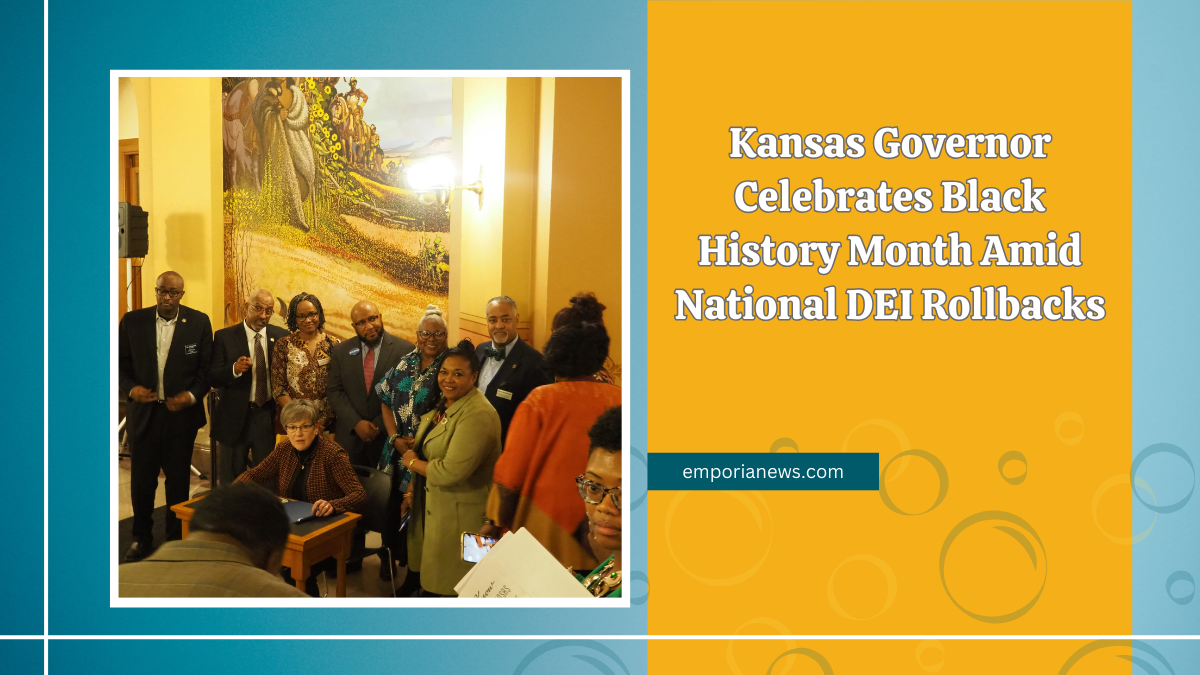Kansas Governor Laura Kelly led a Black History Month celebration at the state Capitol, reinforcing the importance of African American history in Kansas. This initiative contrasts with recent federal actions restricting diversity, equity, and inclusion (DEI) programs under President Donald Trump’s administration.
Governor Kelly’s Commitment to Inclusivity
Governor Kelly emphasized the significance of Kansas’s deep African American history by highlighting:
- Kansas as a Free State – Kansas entered the Union as a free state, playing a crucial role in the fight against slavery.
- The Underground Railroad – Kansas was an active participant in aiding enslaved individuals seeking freedom.
- Brown v. Board of Education – A landmark Supreme Court case that overturned racial segregation in schools originated in Kansas.
She emphasized that celebrating history is not enough; action is necessary to ensure inclusivity. Governor Kelly’s administration aims to:
- Build a government that represents all Kansans.
- Ensure equal opportunities for all communities.
- Deliver real results that foster diversity and inclusion.
Calls for Increased Civic Engagement
Elected officials called for greater public participation in legislative processes, urging community involvement:
- Rep. Ford Carr (D-Wichita): Stressed that lack of participation hinders Black history recognition in the Statehouse.
- Rep. Barbara Ballard (D-Lawrence): Encouraged citizens to contact lawmakers, voice concerns, and engage in policymaking.
- Governor Kelly: Motivated individuals to run for office or serve their communities in leadership roles.
These leaders highlighted that engagement is key to preserving and advancing diversity and inclusion efforts in Kansas.
Community Perspectives on Black History Month
Community members expressed their support for Black History Month and DEI initiatives:
- Shelby Ross (Topeka): Attended the event to stay informed about legislative efforts affecting DEI policies in education.
- B.J. Cherilus (Fort Leavenworth, Phi Beta Sigma Fraternity): Emphasized that:
- Celebrating Black history inspires younger generations.
- Children should see successful role models and understand they can achieve beyond societal limitations.
- Tiffany Criss (Topeka & Lawrence, Zeta Phi Beta Sorority):
- Highlighted that Black history is American history.
- Stressed the importance of accurate historical representation in education.
These perspectives reflect the ongoing effort to ensure Black history remains an integral part of American history.
Federal Actions Contradicting DEI Initiatives
Despite issuing a proclamation recognizing February as Black History Month, President Trump’s administration has simultaneously rolled back DEI efforts:
- The Department of Defense:
- Announced that Black History Month and other cultural observances will no longer be officially recognized.
- Declared that official resources will not support identity-based celebrations.
- The U.S. Department of Education:
- Issued a directive stating that DEI programs, such as using race in admissions and hiring, constitute illegal discrimination.
- Warned educational institutions that promoting diversity could result in loss of federal funding.
- Executive Orders & Policy Changes:
- Limited DEI-related initiatives across federal agencies and institutions.
These policy shifts conflict with efforts to recognize and celebrate Black history at the state level, creating ongoing debates about racial equity and historical education.
Contrasting Actions on Black History Month
| Entity | Action |
|---|---|
| Kansas State Government | Governor Kelly leads Black History Month celebrations, promoting inclusivity and historical recognition. |
| Federal Government | President Trump acknowledges Black History Month but restricts DEI programs and cultural observances. |
FAQs
- What actions has Governor Laura Kelly taken to celebrate Black History Month?
- She hosted a statewide event, signed a proclamation, and emphasized Kansas’s historical role in racial equality.
- How does the Trump administration’s stance on DEI initiatives affect Black History Month observances?
- While President Trump issued a proclamation, his administration has dismantled DEI programs and removed federal recognition of cultural observances.
- Why is civic engagement important in preserving Black history initiatives?
- Active participation in government ensures continued recognition and support for diversity policies.




